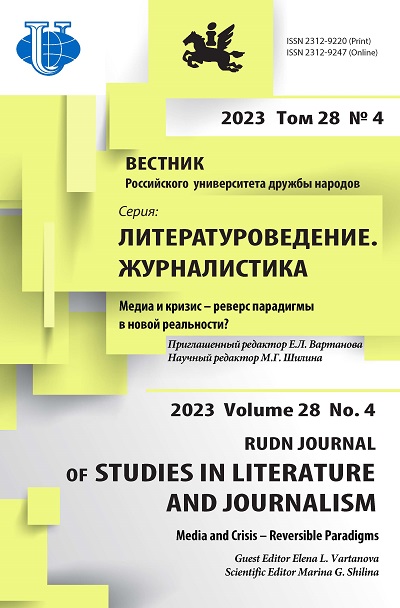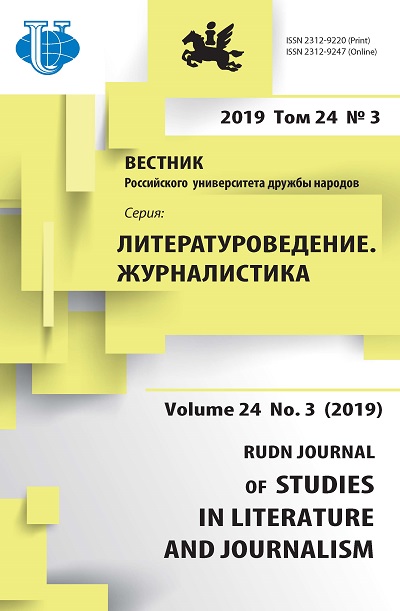Project training of foreign students: authors' experience
- Authors: Kokhanova L.A.1, Tianenzi H.M.1
-
Affiliations:
- Lomonosov Moscow State University
- Issue: Vol 24, No 3 (2019)
- Pages: 554-562
- Section: JOURNALISM
- URL: https://journals.rudn.ru/literary-criticism/article/view/22349
- DOI: https://doi.org/10.22363/2312-9220-2019-24-3-554-562
Cite item
Full Text
Abstract
The article summarizes the authors' experience in the organization of project training and its essential components (concept, tasks and characteristics). The authors consider the experience of teaching specialized journalism courses for foreign undergraduates of the Faculty of Journalism at Lomonosov Moscow State University. Following the results of several training projects and analysis of participants' profiles, the authors draw conclusions about the prospects of the project form of training journalists: it meets the demands of the media industry in terms of digitalization and ensures personal development. The development of project-based learning is evidence of a paradigm shift in teaching: from the culture of utility, functionality to the culture of dignity and integrative presence.
About the authors
Lyudmila A. Kokhanova
Lomonosov Moscow State University
Author for correspondence.
Email: l_kokhanova@mail.ru
Doctor of Philology, Professor at the Faculty of Journalism of Lomonosov Moscow State University
9 Mokhovaya St., bldg. 1, Moscow, 125009, Russian FederationHuang M. Tianenzi
Lomonosov Moscow State University
Email: a89264717488@gmail.com
postgraduate student of Faculty of Journalism of Lomonosov Moscow State University
9 Mokhovaya St., bldg. 1, Moscow, 125009, Russian FederationReferences
- Bolee tysyachi predstavitelej Kitaya primut uchastie v PMEF-2019 [More than thousand representatives from China will attend the SPIEF-2019]. 31.05.2019. https://ria.ru/ 20190531/1555146338.html (accessed: 12.06.2019).
- Dugin E.Ya. Metodologicheskij povorot issledovanij informacionno-kommunikativnyh sistem i zhurnalistiki [Methodological turn of research of information and communication systems and journalism] // Journalist. Social communications. 2015. No. 3–4. Pp. 81–102.
- Bogin G.I. Obretenie sposobnosti ponimat': vvedenie v germenevtiku [The ability to understand: an introduction to hermeneutics]. Tver, 2001.
- Chereshneva Yu.E., Kokhanova L.A., Golovko S.B. Proektnoe obuchenie kak sposob motivirovat' na professiyu (iz opyta podgotovki zhurnalistov) [Project training as a way to motivate for the profession (from the experience of training journalists)] // Razvitie nauki i obrazovaniya: kollektivnaya monografiya. Vyp. 2 [Development of science and education: collective monograph. Vol. 2] / ed. by E.N. Ryabinina. Cheboksary: Sreda Publ., 2018. Pp. 316–325.
- Kovaleva N.B. Proektnye harakteristiki ponimaniya hudozhestvennogo teksta [Project characteristics of understanding an artistic text] // Society: sociology, psychology, pedagogy. 2016. No. 4. Pp. 72–75.
- Avtonomov A.S., Khananashvili N.L. Ocenka social'nyh proektov [Assessment of social projects]. Moscow: Yurist Publ., 2015.
- Slobodchikov V.I. Antropologicheskaya perspektiva otechestvennogo obrazovaniya [Anthropological perspective of domestic education]. Ekaterinburg, 2009.
- Volkova I.I. Proekt dlya budushchih PR-specialistov “gra v kopirajting”: uchastie inostrannyh studentov [Project for future PR-specialists “The game of copywriting”: the participation of foreign students] // Innovacionnoe prepodavanie russkogo yazyka v usloviyah mnogoyazychiya: sbornik statej: v 2 t. T. 2 / ed. by N.M. Rumyanceva. Moscow: RUDN University, 2014. Pp. 134–137.
- Desyaeva N.D. et al. Gamification in Education: Boss Fight // European Proceedings of Social and Behavioural Sciences. 2017. No. 3. Pp. 61–69.
















